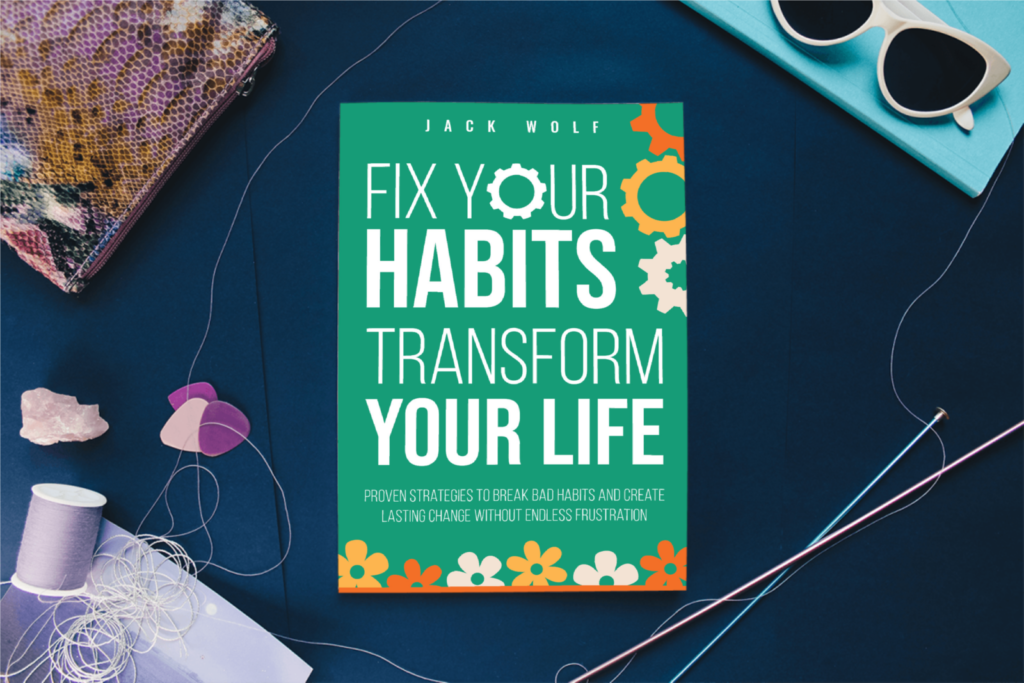Why You Keep Getting Stuck (And How to Fix It)
Picture yourself five years from now.
Are you thriving—crushing your goals, feeling confident, and waking up excited about your life? Or are you still stuck in the same old bad habits, wondering why nothing ever changes?
If you’re tired of spinning your wheels, let’s get real about what’s holding you back: your focus.
Most people think breaking bad habits is about sheer discipline and willpower. That’s a lie. The real secret is where you put your attention.
If you keep focusing on what not to do, you’ll keep repeating the same mistakes. But if you train your mind to focus on what you actually want, your habits will start to shift—naturally.
Why Most People Fail at Breaking Bad Habits
Myth #1: Willpower Alone Will Save You
Ever tried to “just be more disciplined” to quit a bad habit? How’d that go?
The truth is, willpower is like your phone battery—it drains fast.
If your whole plan relies on “staying motivated,” you’ll burn out before you see results.
Instead, build a system. Habits stick when they’re automatic, not when they rely on you trying really hard. You need a structure that keeps you on track even when motivation disappears.
Myth #2: You Need to Fully Understand Your Past First
A lot of people get stuck overanalyzing their past mistakes.
They believe that if they can just pinpoint exactly what went wrong, they’ll magically avoid it in the future.
This is a mental trap.
Stop obsessing over your past. Reflection is good, but dwelling is a momentum killer. Instead of overanalyzing failures, put your energy into creating the future you actually want.
Why Focusing on Bad Habits Keeps You Stuck
When my son was learning to ride his bike, I took him to an open field. There was one tree in the entire space—just one.
As I let go of his bike, I said, “Ride wherever you want. Just don’t hit that tree.”
Guess what happened?
He stared at the tree, panicked, and rode straight into it.
That’s what happens when you focus on what you’re trying to avoid—you steer straight into it.
If you keep telling yourself “I need to stop procrastinating” or “I can’t eat junk food anymore,” your brain still fixates on the problem.
Instead, shift your mindset to:
- I am a focused, productive person.
- I fuel my body with healthy choices.
- I move toward success every day.
How to Break Bad Habits and Replace Them with Good Ones
Step 1: Find Your Real Reason for Changing
If your goal is just “I want to quit smoking” or “I should stop wasting time,” you’ll fail. That’s too shallow. Your goals must be connected to a deeply meaningful motivation, or you’ll quit when things get tough. We often bury our dreams and desires so deeply because of the disappointments of life that we must learn to rediscover and reconnect with them.
To uncover your true motivation, consider an exercise called “Seven Levels of Why.”
Try this:
- Ask yourself why you want to change.
- Then ask why again.
- Keep going until you reach the seventh level of why.
Example:
- “I want to stop procrastinating.”
- “Because I want to achieve more in life.”
- “Because I want to feel in control of my future.”
- “Because I don’t want to look back in 10 years with regret.”
When your why hits deep enough, quitting the bad habit becomes non-negotiable.
Step 2: Replace the Bad Habit (Don’t Just “Quit” It)
Your brain hates a vacuum. If you try to cut a bad habit without replacing it, you’ll relapse fast.
Instead, swap it for something better.
- Mindless social media scrolling? Replace it with reading five pages of a book.
- Late-night snacking? Swap it for drinking tea or brushing your teeth earlier.
- Wasting time in the morning? Fill that space with a five-minute walk or planning your day.
You’re not just quitting a habit. You’re upgrading your life.
Step 3: Make Bad Habits Harder and Good Habits Easier
Habits are tied to convenience. If a bad habit is too easy, you’ll keep doing it. If a good habit is too hard, you’ll avoid it.
- Want to stop junk food cravings? Don’t keep it in your house.
- Want to work out more? Lay out your clothes the night before.
- Want to waste less time online? Delete the apps or set time limits.
Make bad habits annoying and good habits effortless.
Step 4: Focus on Small Wins (Not Massive Changes Overnight)
Don’t try to change everything at once. Focus on small wins that add up over time.
- Want to write a book? Start with 100 words a day.
- Want to get in shape? Start with 10 push-ups.
- Want to improve focus? Start by eliminating one distraction today.
When small wins stack up, they become unstoppable momentum.
FAQ: Breaking Bad Habits and Staying on Track
How do I stop falling back into bad habits?
Remove triggers. If you always scroll social media before bed, charge your phone in another room. Make failure inconvenient.
Why do I keep repeating bad habits even when I know they’re bad?
Your brain is wired for comfort. Bad habits feel easy because they give quick rewards. Replace them with better rewards.
What’s the best way to stay consistent?
Lower the bar. People quit when they make things too hard. Start so small it’s impossible to fail.
Final Thoughts: Where Are You Steering Your Life?
If you want to break bad habits and actually change your life, stop focusing on what you don’t want.
- Get clear on your why. Dig deep. Make it personal.
- Replace bad habits with good ones. Swap, don’t just quit.
- Make failure inconvenient and success easy. Design your environment for change.
- Take small, daily actions. Win the day, and success will follow.
Look at your habits right now. Are they leading you toward the life you want, or keeping you stuck?
Steer toward the future you want, starting today.
Want Help?
For more help and insight on breaking bad habits and building lasting success, grab your copy of Fix Your Habits, Transform Your Life today at https://www.amazon.com/dp/B0DWSX897L. This book isn’t just motivational fluff—it’s built on proven psychological principles of habit formation, identity-based change, and behavioral science. You’ll learn the same principles used by elite athletes, high-performing entrepreneurs, and top psychologists to create lasting change.

References
- Baumeister, R. F., Bratslavsky, E., Muraven, M., & Tice, D. M. (1998). Ego depletion: Is the active self a limited resource? Journal of Personality and Social Psychology, 74(5), 1252–1265. Retrieved from https://faculty.washington.edu/jdb/345/345%20Articles/Baumeister%20et%20al.%20(1998).pdf
- Gardner, B., Lally, P., & Wardle, J. (2023). Time to Form a Habit: A Systematic Review and Meta-Analysis of Health Behaviour Habit Formation and Its Determinants. Retrieved from https://www.researchgate.net/publication/386593213_Time_to_Form_a_Habit_A_Systematic_Review_and_Meta-Analysis_of_Health_Behaviour_Habit_Formation_and_Its_Determinants
- Wood, W., & Neal, D. T. (2016). Making Health Habitual: The Psychology of ‘Habit-Formation’ and General Practice. British Journal of General Practice, 66(647), 550-551. Retrieved from https://pmc.ncbi.nlm.nih.gov/articles/PMC3505409/
About Jack Wolf:
Jack is the self-proclaimed superhero of the self-help world—minus the cape and the tight spandex (thank goodness)—is a lighthouse for many in the stormy seas of life. With a passion for words that could rival a teenage crush, Jack turns every page he publishes into joy and hope for the soul.
Connect on Social:

